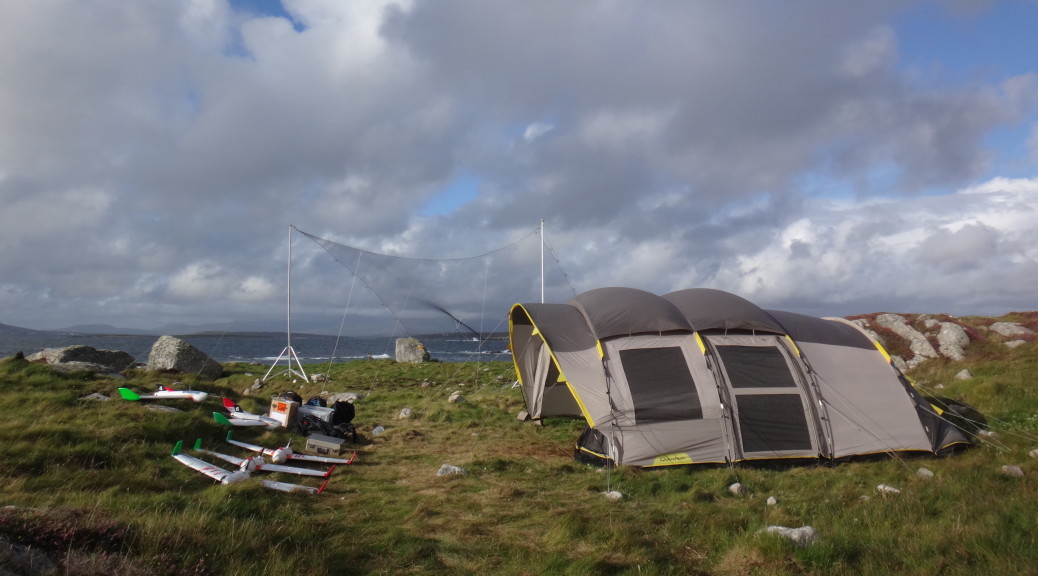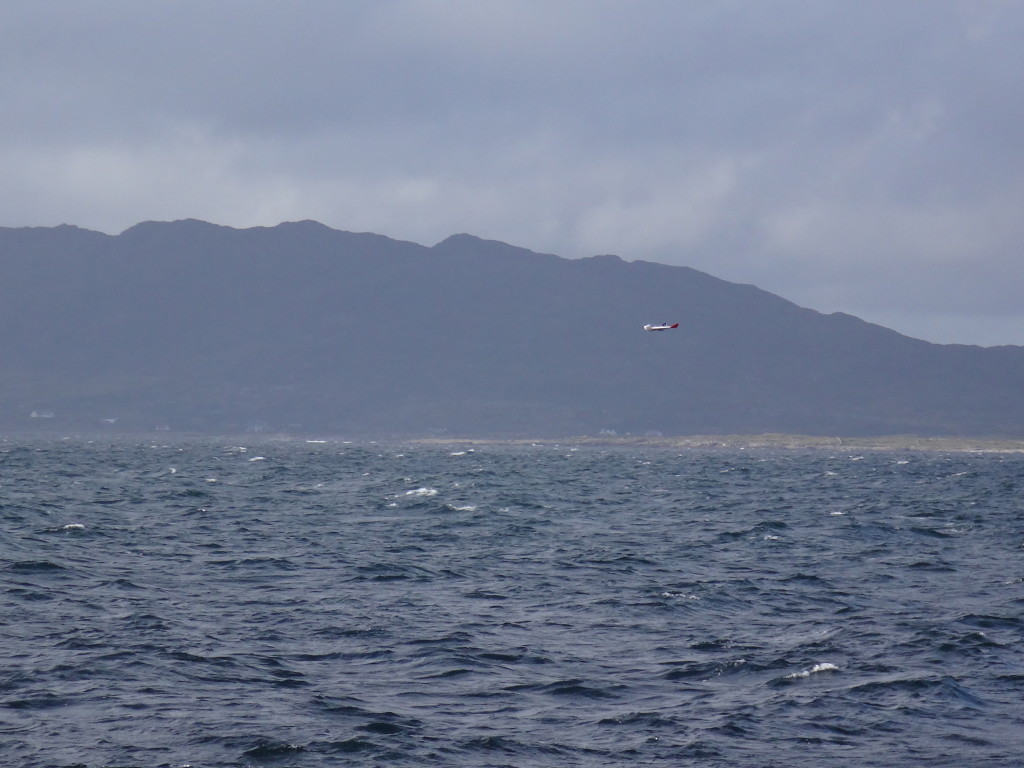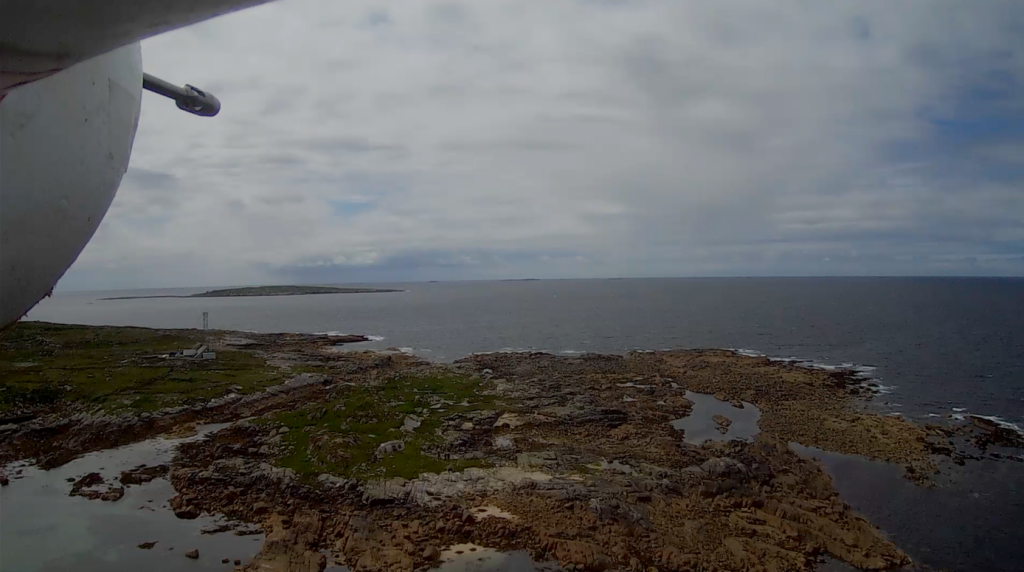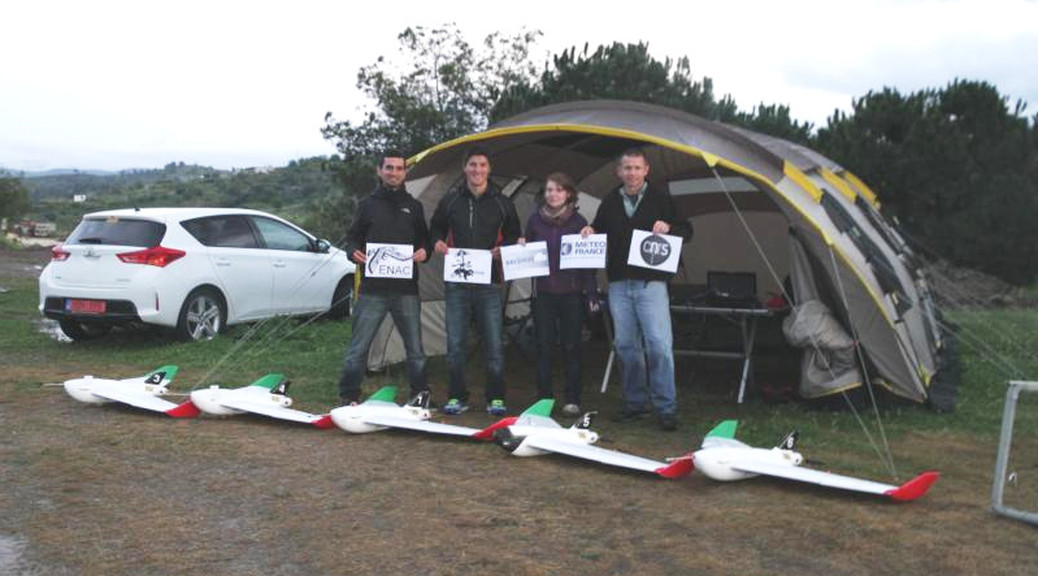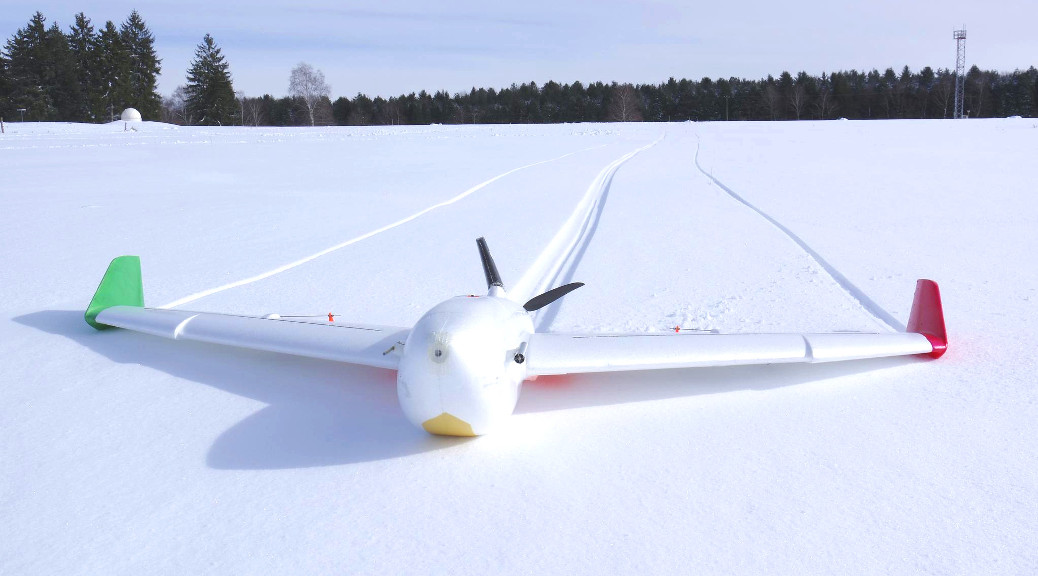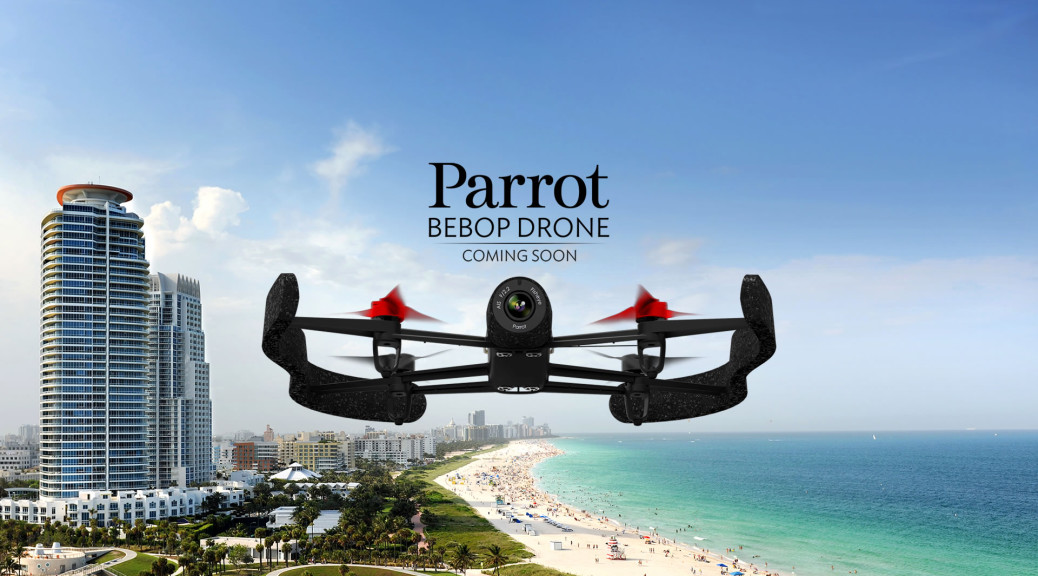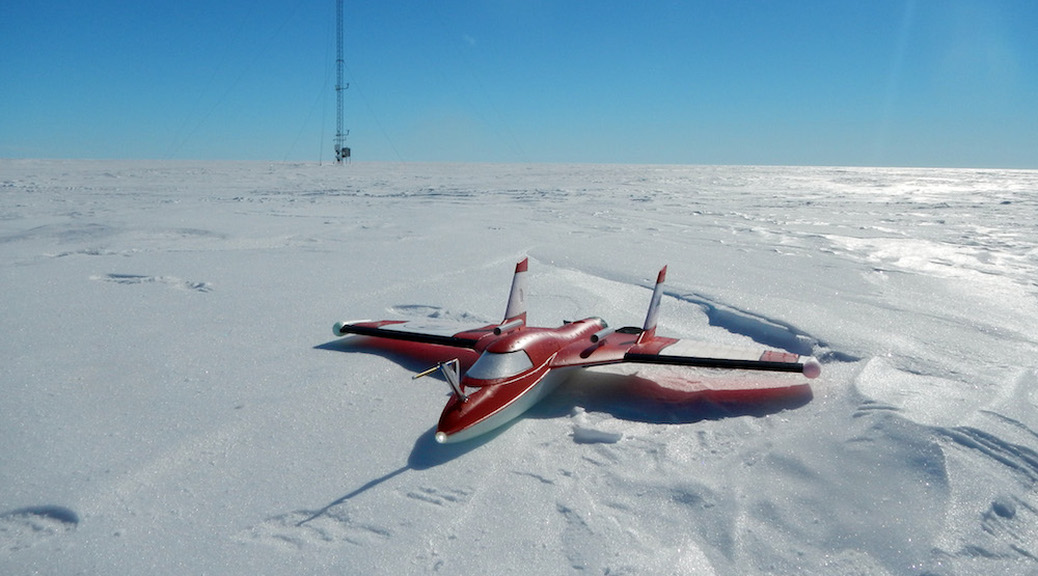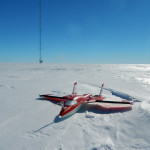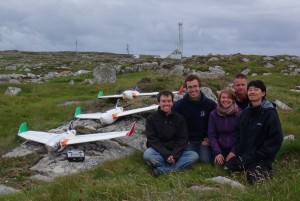 Researchers from the GMEI/MNPCA have recently returned from a one month field measurement campaign at the weather
Researchers from the GMEI/MNPCA have recently returned from a one month field measurement campaign at the weather
station of Mace Head in Ireland.
Their report was very positive with more than forty scientific flights, up to 3350m above sea level, some of them synchronized with a
meteorological satellite overpass, for the study of interactions between clouds and aerosols.
Several unmanned aircraft, equipped with the Paparazzi UAV
systems, have been used, carrying meteorological, aerosol, cloud and 3D wind sensors.
A bungee was used for taking-off, while a big net was needed in
order to recover the planes, since the ground was not suitable for traditional landings.
This campaign was part of the BACCHUS project (Impact of
Biogenic versus Anthropogenic emissions on Clouds and Climate: towards a Holistic UnderStanding).
All posts by paparazzi
IMAV 2015 Competition
This year‘s International Micro Air Vehicles Conference and Flight Competition (IMAV 2015) is organized by the Institute of Flight 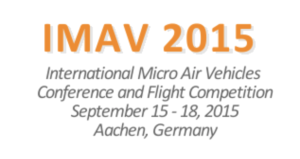
System Dynamics of the RWTH Aachen University and the
German Institute of Navigation. It takes place in Aachen, Germany from September 15 – 18, 2015. If you are in the area, you should check out the event.
IMAV is a yearly event that combines a diversified scientific conference with a technological competition involving Micro Air Vehicles (MAVs). Such a combination allows research groups from all over the world to share their knowledge, and stimulates them to focus on research that can be used in real life scenarios. Every year the competition scenarios become more advanced and more extensive. However, competitors are given the opportunity to either do complete missions, or to focus on sub-elements of the mission scenario.
The 2015 competition will consist of both an outdoor and an indoor part. The focus is put on the following tasks: surveillance, recognition, logisitics, precise maneuvering in combination with endurance.
Paparazzi at the National Center for Meteorological Research
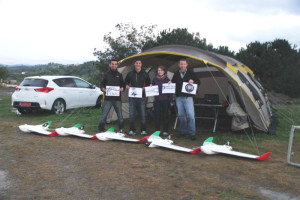 The National Center for Meteorological Research (CNRM-GAME, Toulouse, France) conducted an airborne experiment in Cyprus in March 2015 as part of the BACCHUS project. The main goal of CNRM‘s contribution is to complement the ground-based observations of aerosol and cloud condensation nuclei with airborne measurements to characterize the vertical distribution of aerosol, radiative fluxes, 3D wind vectors and meteorological state parameters. As payloads were limited to 500g (and total weight < 2.5kg), multiple RPAS (remotely piloted aircraft systems) were instrumented for a specific scientific focus. The Paparazzi system was used to navigate the RPAS. During the campaign, airborne measurements were taken over 4 weeks (5 March to 2 April, 2015) with 52 research flights and 38 hours of flight time. Vertical profile were regularly sampled up to 2100 m.asl (limited by authorized flight ceiling) and often observed the layers of dust originating from the Arabian Peninsula and the Sahara Desert. RPAS profiles generally show a well-mixed boundary layer and compare well with ground-based LIDAR observations. Flights below and within clouds were also coordinated with satellite overpasses to perform ‘top-down’ closure of cloud micro-physical properties.
The National Center for Meteorological Research (CNRM-GAME, Toulouse, France) conducted an airborne experiment in Cyprus in March 2015 as part of the BACCHUS project. The main goal of CNRM‘s contribution is to complement the ground-based observations of aerosol and cloud condensation nuclei with airborne measurements to characterize the vertical distribution of aerosol, radiative fluxes, 3D wind vectors and meteorological state parameters. As payloads were limited to 500g (and total weight < 2.5kg), multiple RPAS (remotely piloted aircraft systems) were instrumented for a specific scientific focus. The Paparazzi system was used to navigate the RPAS. During the campaign, airborne measurements were taken over 4 weeks (5 March to 2 April, 2015) with 52 research flights and 38 hours of flight time. Vertical profile were regularly sampled up to 2100 m.asl (limited by authorized flight ceiling) and often observed the layers of dust originating from the Arabian Peninsula and the Sahara Desert. RPAS profiles generally show a well-mixed boundary layer and compare well with ground-based LIDAR observations. Flights below and within clouds were also coordinated with satellite overpasses to perform ‘top-down’ closure of cloud micro-physical properties.
ENAC Flying Paparazzi Aircraft at the Atmospheric Research Center of Lannemezan
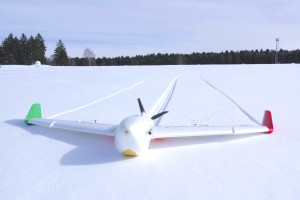 The ENAC team has been flying several aircraft (X6-Skywalker, Easystar, Funjet) at the Atmospheric Research Center of Lannemezan, close to the Pyrenees in the south of France. The goal was to prepare several meteorological planes for research studies held by Meteo France that will be held next month in Cyprus. Weather conditions were pretty harsh some times, with snow and icy fog, but also provided some really nice pictures, and of course interesting flights up to 1400m AGL with meteorological instruments.
The ENAC team has been flying several aircraft (X6-Skywalker, Easystar, Funjet) at the Atmospheric Research Center of Lannemezan, close to the Pyrenees in the south of France. The goal was to prepare several meteorological planes for research studies held by Meteo France that will be held next month in Cyprus. Weather conditions were pretty harsh some times, with snow and icy fog, but also provided some really nice pictures, and of course interesting flights up to 1400m AGL with meteorological instruments.
See this video of the previous campaign:
Or this other video of the first tests of automatic bungee takeoff for the heavier planes (up to 2.5kg):
Parrot Bebop Paparazzi Integration
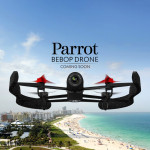 As you know paparazzi is a very modular platform. To show the world how modular we are, we worked hard on implementing paparazzi into the Parrot Bebop. At the Micro Aerial Vehicle Laboratory (MAVLab) of Delft University of Technology faculty Aerospace engineering (TU Delft) we received a pre-production model of the Bebop. We did our best to have paparazzi integrated before the launch of the Bebop. If you want to follow the progress check our (youtube channel).
As you know paparazzi is a very modular platform. To show the world how modular we are, we worked hard on implementing paparazzi into the Parrot Bebop. At the Micro Aerial Vehicle Laboratory (MAVLab) of Delft University of Technology faculty Aerospace engineering (TU Delft) we received a pre-production model of the Bebop. We did our best to have paparazzi integrated before the launch of the Bebop. If you want to follow the progress check our (youtube channel).
4 hours after reception of the Bebop
8 hours later after hacking the ESC check-sum we had our First Flight!!!!
4 hours later our first autonomous outdoor flight in paparazzi !!!
IMAV 2014 Live Streams
 The Micro Aerial Vehicle Laboratory (MAVLab) of Delft University of Technology (TU Delft) is proud the present the 2014 International Micro Air Vehicle Conference (IMAV 2014), now offering the possibility of attending the conference by live stream free-of-cost. The live stream will support most platforms showing innovative keynotes of pioneers in the industry as well as the current state-of-the-art presented by many researchers working on MAV’s. The schedule is published on the website of the conference.
The Micro Aerial Vehicle Laboratory (MAVLab) of Delft University of Technology (TU Delft) is proud the present the 2014 International Micro Air Vehicle Conference (IMAV 2014), now offering the possibility of attending the conference by live stream free-of-cost. The live stream will support most platforms showing innovative keynotes of pioneers in the industry as well as the current state-of-the-art presented by many researchers working on MAV’s. The schedule is published on the website of the conference.
Tuesday, August 12th, 2014
Thursday, August 14th, 2014
Friday, August 15th, 2014
Paparazzi on Android
 The Android application PPRZonDroid, a GCS extension for Android devices that you can use to control Paparazzi aircraft, is now available on Google Play.
The Android application PPRZonDroid, a GCS extension for Android devices that you can use to control Paparazzi aircraft, is now available on Google Play.
Paparazzi SUMO in Remote Antarctica
Antarctica Meteo Missions 2013
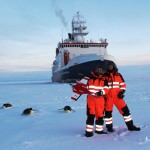 Over the last 9 weeks the Paparazzi autopilot has been used for operations with remotely piloted aircraft from the Finnish Meteorological Institute for scientific research on board the R.V. Polarstern in the Weddell Sea/Antarctica. You can see the course and read a short report on the homepage of the Alfred Wegener Institut.
Over the last 9 weeks the Paparazzi autopilot has been used for operations with remotely piloted aircraft from the Finnish Meteorological Institute for scientific research on board the R.V. Polarstern in the Weddell Sea/Antarctica. You can see the course and read a short report on the homepage of the Alfred Wegener Institut.
Instructions on how to build your own small unmanned meteorological observer (SUMO) can be found here in the Wiki.
Autonomous Paparazzi Parrot AR Drone
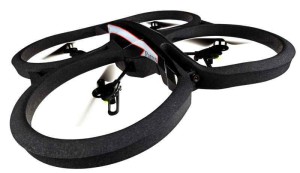 At the TU Delft university of technology student teams made the impossible; possible. Now you can turn your AR Drone v2 into an autonomous drone, controlled by Paparazzi autopilot software. It’s simple, Insert GPS receiver into USB port, build and upload your flight plan via WiFi, and you are done! No hardware modification needed.
At the TU Delft university of technology student teams made the impossible; possible. Now you can turn your AR Drone v2 into an autonomous drone, controlled by Paparazzi autopilot software. It’s simple, Insert GPS receiver into USB port, build and upload your flight plan via WiFi, and you are done! No hardware modification needed.
…and remember, it is a Wiki, you are invited to improve the contents, as a matter of fact, we would love it!
